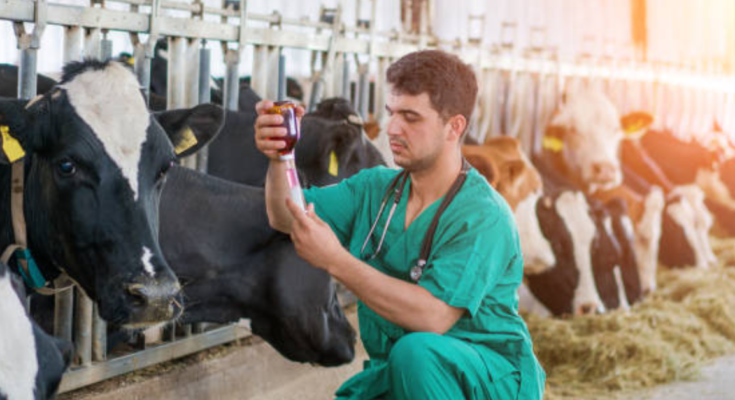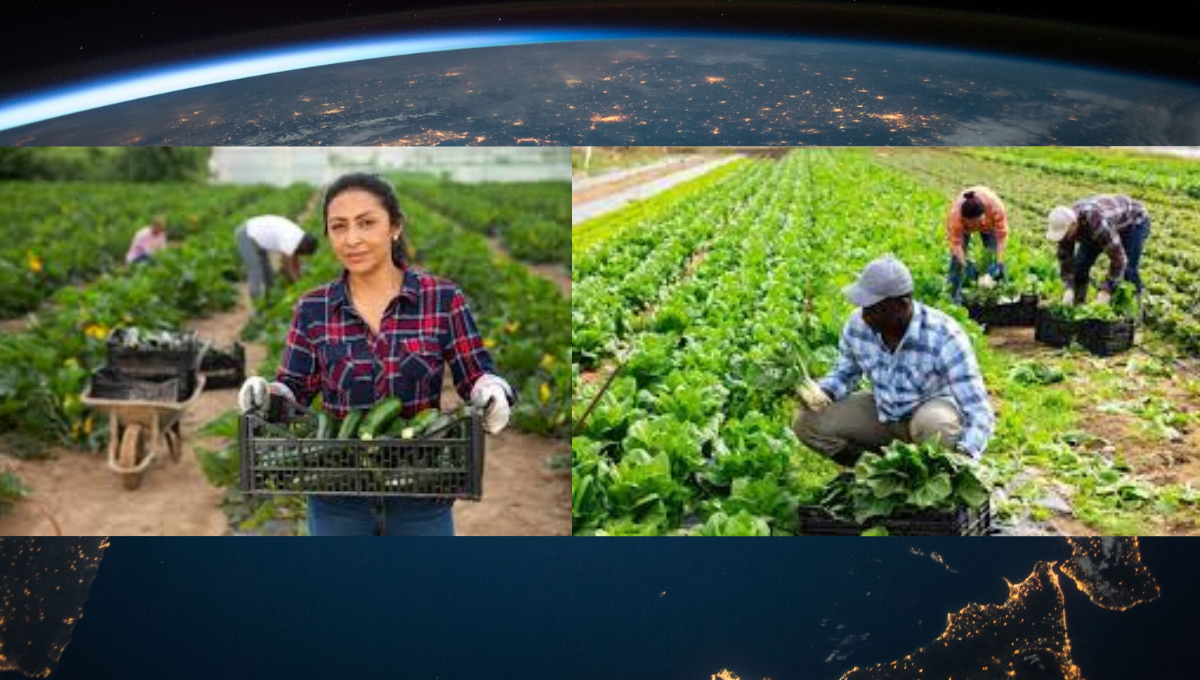Farm employment in Australia with free visa sponsorship can be the ideal chance for you Cattle Farm Full Time Jobs in Australia Dec 2024 if you want to work in the country’s booming farming sector and start a new, exciting journey! This thorough guide will cover a wide range of topics related to working in Australia’s agricultural industry, such as available farm employment, visa sponsorship alternatives, and advice on how to find and apply for these opportunities. Prepare to learn how our professional guidance and insights will help you launch your agricultural career in Australia. Australia’s beef industry is one of the largest in the world, contributing significantly to the country’s economy. Beef farm worker jobs are essential to this industry, offering a range of opportunities for those interested in agriculture and livestock management. These jobs typically involve tasks such as feeding and caring for cattle, maintaining farm equipment, and assisting with breeding and health management. Workers may also be involved in the processing and packaging of beef products. The demand for beef farm workers in Australia is driven by the country’s extensive cattle ranches and the global demand for high-quality Australian beef. Many farms offer on-the-job training, making it accessible for individuals without prior experience in agriculture. Additionally, these jobs can be a gateway to more advanced positions within the industry, such as farm management or specialized roles in animal health and nutrition.
One of the key benefits of working on a beef farm in Australia is the opportunity to work outdoors and engage in physical activity. This can be appealing for those who prefer a hands-on job and enjoy being in nature. The work can be physically demanding, but it is also rewarding, as workers play a crucial role in the production of a vital food source. Moreover, beef farm workers often develop a strong sense of community, as they work closely with other farm staff and sometimes live on the farm itself. This can lead to lasting friendships and a supportive work environment. In terms of job prospects, the beef industry in Australia is expected to remain strong, with steady demand for beef products both domestically and internationally. This means that there will continue to be a need for skilled and dedicated workers in this field. Additionally, advancements in farming technology and practices are creating new opportunities for workers to learn and apply innovative techniques in cattle management and beef production.
Overview of Sponsorship for Australian Work Visas
It’s critical to comprehend the various visa sponsorship options and their prerequisites when thinking about agricultural employment in Australia with sponsorship. Depending on the type of work and length of employment, Australian employers can sponsor qualified foreign workers through a variety of visa schemes. Here is a more thorough rundown of the primary alternatives for visa sponsorship Subclass 482 of the Temporary Skill Shortage (TSS) Visa In order to address a shortfall in the local labor market, firms in Australia may temporarily sponsor talented foreign workers under the Temporary Skill shortfall (TSS) Visa (Subclass 482). There are three categories for this visa: labor agreement, medium-term, and short-term. The length of the visa might range from one to four years, depending on the stream. Possessing pertinent abilities and credentials, fulfilling English language proficiency standards, and receiving a favorable skills evaluation for the chosen profession are important prerequisites. Every position on 482jobs.com offers sponsorship for the 482 Visa.
Subclass 186 of the Employer Nomination Scheme (ENS) Visa
Another kind of sponsorship visa in Australia that allows Australian companies to propose qualified foreign workers for permanent jobs in the nation is the Employer Nomination Scheme (ENS) Visa (Subclass 186). Direct Entry and Temporary Residence Transition are the two streams of this visa. A favorable skills evaluation, appropriate job experience, and compliance with English language proficiency are prerequisites for the Direct Entry route. TSS visa holders who have worked for their company for a predetermined amount of time are eligible to apply for the Temporary Residence Transition stream. Subclass 187: Regional Sponsored Migration Scheme (RSMS) Visa Lastly, for foreign workers who wish to work in regional Australia, there is the Regional Sponsored Migration Scheme (RSMS) Visa (Subclass 187). Direct Entry, Temporary Residence Transition, and Labor Agreement are the three streams of this permanent visa. This visa’s qualifying requirements are comparable to those of the ENS Visa.
An Overview of Australia’s Farming Sector by State
Every state in the large nation of Australia offers distinct agricultural potential. Let’s investigate the farming sector in several Australian states and learn what each has to offer. With a varied climate and fertile soils that support a variety of farming pursuits, New South Wales (NSW) is one of Australia’s major agricultural producers. Dairy farming, the production of cattle and sheep, the growing of fruits and vegetables, and the cultivation of wheat and barley are the state’s main agricultural industries. The Central West, Murray, and Riverina regions are important agricultural regions in New South Wales. Victoria (VIC): Known for its dairy, sheep, and cattle industries, Victoria is a state in southeast Australia. A sizable amount of the country’s fruits, vegetables, and cereals are also produced in the state. Gippsland, the Western District, and the Murray River region are some of Victoria’s most notable agricultural areas. Queensland (QLD): A wide variety of agricultural activities are practiced in Queensland due to its large geographical area and variable climate. The state is well-known for its large-scale sugar cane, tropical fruit, and beef cattle industries. The Darling Downs, Far North Queensland, and Central Queensland are some of Queensland’s most important agricultural areas. South Australia (SA): The country’s excellent soils and arid environment make it the perfect place to grow a variety of crops, including canola, wheat, and barley. The state is also well known for its wine sector, with world-class wines produced in areas like the Clare Valley and Barossa Valley. In South Australia, livestock farming—especially that of sheep and beef—is another important industry.
Western Australia (WA): The largest state in the nation, WA has a wealth of agricultural prospects. Horticulture, cattle and sheep husbandry, and grain production are the state’s primary agricultural pursuits. Western Australia’s South West, Great Southern, and Wheatbelt regions are important agricultural regions.
Tasmania (TAS): A variety of agricultural pursuits are well suited to Tasmania’s mild environment and rich soils. The island state is well-known for its dairy sector, production of sheep and cattle, and cultivation of premium fruit, especially berries and apples. Tasmania’s Huon Valley, Central Highlands, and North West are important farming areas. Northern Territory (NT): The Northern Territory’s extensive geographical area and tropical temperature facilitate a range of agricultural pursuits, like as horticulture, cattle ranching, and the cultivation of mangoes and melon. The Top End, Katherine, and Alice Springs regions are the main agricultural areas of the NT.
Every Australian state has its own distinct agricultural industry and provides different farming prospects. By being aware of regional variations, you may focus your job search on regions or sectors that most closely match your skills and interests.
A Summary of the Most Common Farming Jobs in Australia
The following is a list of common farming jobs in Australia that frequently call for sponsorship for a visa: Harvesting fruits including apples, oranges, grapes, and berries is part of this seasonal employment opportunity in Australia that offers visa sponsorship. Because these jobs are flexible and available, travelers and international workers frequently choose it. Jobs on dairy farms with sponsored visas: Australia has a sizable dairy farming sector that needs experienced laborers to assist with routine duties including milking, raising calves, and farm upkeep.
Jobs for foreigners working as farmworkers in Australia: For farms to run smoothly, general farm laborers are necessary. They carry out a variety of duties, including planting, watering, harvesting, and repairing agricultural machinery. For foreign workers, these jobs provide an excellent starting point into the Australian farming sector.
Jobs on livestock farms with sponsored visas: Australian livestock farms, such as those raising cattle, sheep, and pigs, frequently require foreign workers to help with animal care, feeding, and breeding. Jobs in horticulture farms with sponsored visas: The horticulture sector in Australia includes a range of crops, such as nuts, flowers, and vegetables. This industry offers jobs in plant breeding, greenhouse management, and nurseries.
Advice for Obtaining Farming Jobs
It may be thrilling and difficult to start your search for agricultural employment in Australia with a sponsored visa. Don’t worry, though; we’re here to guide you through the procedure and increase your chances of getting that ideal agricultural position. We’ll give helpful advice and ideas on how to look for and apply for farm jobs that sponsor visas in this area. We’ll walk you through the process of improving your chances of success in the cutthroat job market, from making a strong profile on our employment platforms to taking advantage of networking possibilities . To improve your chances of drawing in firms seeking foreign workers with sponsored visas, highlight your job experience, abilities, credentials, and a strong CV. Adding your CV to our database is an excellent first step, since many Australian recruiters and companies go through it for talent. Click here to do so.
Look for and Apply for Jobs
To locate agricultural jobs in Australia with free visa sponsorship in 2024, use the search options on 482jobs.com. To stand out from the competition, make sure your application is customized to the job needs and emphasizes your relevant experience and talents.
Make Connections with Other Industry Professionals
Networking may be a very effective job search strategy while searching for agricultural employment in Australia with free visa sponsorship. To network with people in the agricultural business, join social media groups and online forums and go to industry events. This may also result in recommendations for jobs that sponsor visas and help you keep up with the most recent job vacancies.
Think About Seasonal and Regional Work
There are frequently more job vacancies and a higher likelihood of visa sponsorship for regional and seasonal labor, such as fruit harvesting positions in Australia. Have an open mind about moving to a rural region and working seasonal jobs, since they can be a springboard to more steady and long-term work in the field. The Working Holiday Visa, which permits young people from qualified nations to work and travel in Australia for a maximum of 12 months, provides an additional choice for individuals looking for farm employment in Australia. The purpose of this visa is to promote stronger relations and cultural interaction between Australia and participating nations.
APPLY ALSO: New Zealand s New Seasonal Work Visa for 2025: Roles, Salaries, and Application Process
Australia offers two different kinds of working holiday visas
Passport holders from Belgium, Canada, Cyprus, Denmark, Estonia, Finland, France, Germany, Hong Kong, Republic of Ireland, Italy, Japan, Republic of Korea, Malta, Netherlands, Norway, Sweden, Taiwan, and the United Kingdom are eligible for the Working Holiday Visa (Subclass 417).Passengers from Argentina, Austria, Chile, China, Czech Republic, Ecuador, Greece, Hungary, Indonesia, Israel, Luxembourg, Malaysia, Peru, Poland, Portugal, San Marino, Singapore, Slovak Republic, Slovenia, Spain, Thailand, Turkey, the United States, Uruguay, and Vietnam are eligible for the Work and Holiday Visa (Subclass 462). Young individuals searching for farm employment sometimes choose the Working Holiday Visa since it permits holders to work in Australia while they are there. You must do a specific amount of employment in rural Australia, which frequently involves agricultural labor, for a predetermined number of days (typically 88 days) in order to be eligible for a second or third-year extension on this visa. Consider taking advantage of the opportunity to travel and experience the Australian farming business while obtaining experience if you qualify for a Working Holiday Visa. Your employer may sponsor your visa and provide you additional permanent prospects as a result of your seasonal job.
How To Apply
For those considering a career as a beef farm worker in Australia, it is important to be prepared for the challenges of the job. This includes being able to handle the physical demands of the work, as well as being comfortable working with animals. It is also beneficial to have a basic understanding of farm operations and animal husbandry, although many farms provide training for new employees. Additionally, having good communication skills and the ability to work well in a team are important qualities for success in this role. Overall, beef farm worker jobs in Australia offer a unique and rewarding career path for those interested in agriculture and livestock management. With the right preparation and a willingness to learn, individuals can find fulfilling work in this vital industry. Whether you are looking for a temporary job or a long-term career, the beef industry in Australia provides a range of opportunities for growth and development.



